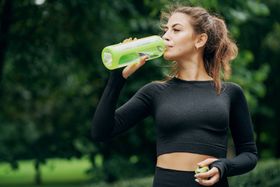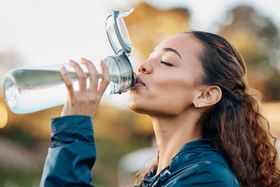4 Ways to Add Electrolytes to Drinking Water for Max Rehydration
Ditch the sugary drinks and try these four refreshing ways for a rehydration boost.
Updated February 4, 2025

Feeling drained and sluggish? Plain water might not be enough to combat dehydration, especially after exercise or in hot weather. Electrolytes, essential minerals lost through sweat, play a crucial role in hydration.
These minerals aren't just for athletes or hangover cures—they're essential for everyday health. They help regulate fluid balance, muscle contractions, and blood pressure. So, let's delve into how you can add electrolytes to your water for optimal hydration.
Benefits of Adding Electrolytes to Drinking Water
Electrolytes, including sodium, potassium, magnesium, and calcium, are essential for a range of bodily functions. These minerals play pivotal roles in:
- Balancing blood pH levels
- Increasing nerve, muscle, heart, and brain functionality
- Rebuilding damaged tissue
- Regulating blood pressure
Although sports drinks are often fortified with these crucial electrolytes to improve athletic performance, you can naturally enrich your water with these vital minerals to reap the same benefits.
4 Ways to Add Electrolytes to Drinking Water
1. Electrolyte Drops
Electrolyte drops conveniently infuse essential minerals like magnesium, potassium, and calcium to your water, promoting hydration and energy throughout the day.
The body absorbs them rapidly, and they offer a quick replenishment without the added sugars or flavorings found in bottled electrolyte drinks, ensuring a healthier alternative.
MAYU Minerals | Electrolyte Drops consist solely of natural ingredients, including magnesium, zinc, potassium, chloride, and over 75 organic ionic trace minerals, delivering all necessary electrolytes without artificial sweeteners.
2. Sea Salt
Salt—sodium chloride—is a crucial electrolyte lost through sweat. The FDA's recommended daily intake is 2300 mg—about one teaspoon. [1] With that in mind, you should add only a pinch to your water to increase electrolyte levels.
When choosing the best salt to boost your water's electrolyte content, consider using sea salt or Himalayan pink. These unprocessed salts offer a rich array of minerals compared to refined table salt, making them preferable for enhancing hydration.
While sea salt swiftly boosts electrolytes at an affordable price, excessive consumption may pose risks such as an unpalatable taste or potential hypertension.
Pros
- Affordable
- Boosts electrolytes quickly
- Has various minerals
Cons
- Taste may not be suitable for everyone
- Excessive use may lead to high blood pressure
3. Ginger
Ginger is a delicious spice and a natural source of electrolytes. Beyond its familiar flavor, ginger contains calcium and magnesium, essential minerals that help your body function optimally. Additionally, it packs a punch of Vitamin C, supporting gut health and potentially aiding in reducing inflammation and pain relief.
Crafting a ginger-infused electrolyte beverage is a straightforward process: crush or slice ginger root and add it to water for a subtle flavor, or steep it in hot water for a more intense infusion. While it offers antioxidants and digestive relief, its preparation demands additional effort and may not suit everyone's palate.
Pros
- Has antioxidants
- Relieves nausea
- Soothes the digestive system
Cons
- Requires additional preparation
- The taste may not be appealing to everyone
4. Watermelon
While 95% of watermelon is water, it's surprisingly rich in electrolytes like potassium (170mg/cup), magnesium (15.2mg/cup), and trace amounts of calcium. [2]
Further enhancing its appeal is the presence of L-citrulline, an amino acid associated with improved oxygen intake. Offering a refreshing and pleasant taste alongside antioxidants and essential vitamins, watermelon presents a delicious yet nutritious electrolyte-rich option. But, it requires preparation and may contain fewer electrolytes compared to alternative sources.
Incorporating watermelon into your diet is an excellent way to naturally add electrolytes to your water, especially for staying hydrated during hot weather or after exercise.
Pros
- Rich in antioxidants and vitamins
- Refreshing, pleasant taste
- Increases oxygen intake through L-citrulline
Cons
- Requires preparation
- Fewer electrolytes compared to other alternatives
Enhance Hydration Naturally and Boost Your Health
While plain water is vital in hydration, electrolytes are crucial for optimal health and well-being. These minerals are essential for various bodily processes, from regulating muscle function to balancing blood pressure.
Fortunately, numerous natural alternatives exist beyond sugary sports drinks to get electrolytes in water—experiment with adding a pinch of sea salt, incorporating slices of ginger, or enjoying refreshing watermelon.
Whether opting for electrolyte drops, sea salt, ginger, or watermelon, each option offers unique benefits and flavors to suit diverse preferences. Prioritize proper hydration with electrolytes for a healthier and more energetic lifestyle.
FAQs
Can I just eat salt for electrolytes?
While salt (sodium chloride) provides sodium, it doesn't supply all essential electrolytes. A balanced intake of potassium, magnesium, and calcium is also important for optimal electrolyte balance and overall health.
Which salt cannot be used directly as an electrolyte?
Table salt (sodium chloride) is generally safe as an electrolyte, but Epsom salt (magnesium sulfate) should not be used directly for electrolyte replenishment in food or drink due to its strong laxative effect.
Which salt is a weak electrolyte?
Acetic acid (sodium acetate) is considered a weak electrolyte because it partially dissociates in water, producing fewer ions compared to strong electrolytes. Other examples include ammonium chloride and sodium bicarbonate.
What are the 3 most common electrolytes?
- Sodium chloride (NaCl): Common table salt, widely used in various applications.
- Potassium chloride (KCl): Often used in food processing and as a potassium supplement.
- Calcium chloride (CaCl₂): Used for de-icing roads and in various industrial processes.
What are 5 symptoms of electrolyte imbalance?
- Muscle cramps or spasms: Often due to low potassium or calcium levels.
- Fatigue or weakness: Can result from imbalances in sodium or potassium.
- Nausea or vomiting: Common with various electrolyte disturbances.
- Confusion or irritability: May occur with sodium imbalances.
- Irregular heartbeat: Associated with imbalances in potassium, calcium, or magnesium.
References:
- “Sodium in Your Diet.” Available: https://www.fda.gov/food/nutrition-education-resources-materials/sodium-your-diet#:~:text=Americans%20eat%20on%20average%20about,1%20teaspoon%20of%20table%20salt!
- J. Cording, “The health benefits of watermelon,” MICHELIN Guide, Jul. 03, 2019. Available: https://guide.michelin.com/us/en/article/features/watermelon-fruit-health-benefits
Disclaimer: The information published by MAYU Water is not a substitute for the expert knowledge, advice, and recommendations of trained professionals. We strongly recommend consulting with industry experts and primary or scientific sources before making any health, research-related, or other important decisions.















































